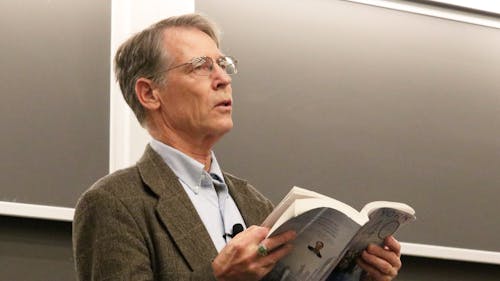Author of 'New York 2140' speaks in panel alongside Rutgers faculty

On Wednesday night, novelist Kim Stanley Robinson read from and discussed his new novel "New York 2140." He was joined by a panel of Rutgers faculty with expertise in climate science.
Robinson is a New York Times bestselling science fiction writer best known for his "Mars" trilogy. M<g>any of</g> his novels and stories have ecological, cultural and political themes running through them.
According to a New Yorker article, he is known as one of the greatest science fiction authors of the time.
The novel New York 2140 features New York City, set more than 100 years from now.
In the story, the city has a rising sea level of 50 feet, and half of the city is submerged. Climate change and global warming is a major theme of the novel.
“You can look at topographic maps from the U.S. Geological Survey and see what would be underwater and what would still be dry,” he said. “Lower Manhattan would be underwater, upper Manhattan mostly above water. Tides would make Midtown a problem zone.”
Robinson explained the book is about finance, climate change, New York as a place and the characters in the story.
“(It’s also about) what we could do now to influence events to make a better future for the people yet to come. Utopian climate change fiction — the obvious next hot genre,” he said.
Robinson said that science fiction is trying to talk about the present and the future through a story. It is not just metaphor, but also a prediction of the future.
“Science fiction has a basis in reality. It is the reality of our time,” he said.
Marjorie B. Kaplan, associate director of the Rutgers Climate Institute, planned the event. She said she thoroughly enjoyed organizing it.
“It provided a way to connect society to climate science. For many, climate change seems like something that will only occur in some unknown future,” Kaplan said.
Robinson's book is a story with realistic characters <g>who</g> embody traits of people we all know, yet their daily existence is imagined in what life under extreme sea-level rise might be, she said.
“As a genre, this gives one pause to think about the very real consequences of unchecked sea-level rise for future generations," Kaplan said.
Robinson said that he focuses on the characters and lets the world-building take care of itself, and h<g>opefully</g> the story will reveal a lot of the parts of the world.
After the book reading, a panel discussed the novel.
It consisted of Rutgers faculty Robert Kopp, Clinton Andrews, Laura Lawson and Jorge Marcone. Their expertise covered climate science, urban planning, urban agriculture and environmental humanities, which are all major themes in Robinson’s book.
The panel discussed how the climate change in the novel could be a reality for the future and how societies must adjust to adapt to the new world.
“What I'm saying is that science fiction is the cultural modeling and that the ramifications of what we’re doing now extends so far off into the future and are so easy to predict now even though there's a broader band the further you get out,” Robinson said. “You can’t predict what will actually happen but you can see a band of possibilities that broadens as you get further away.”
Science fiction, according to Robinson, is a future history that shows what can happen if society continues to make the same choices.
Polina Semenoff, a School of Environmental and Biological Sciences sophomore, said that science fiction is a way to get planetary issues to a wider audience.
“It gets people interested in science who might otherwise not have been interested in actual science,” she said.
Besides climate change and the environment, the novel and the panel discussed how the country would economically be able to handle an event like the flooding in New York.
“It’s also about the way that our economic system doesn’t allow us to afford a decent future,” Robinson said.
He ended the night with some words of wisdom before thanking the audience for taking their time to be there.
“Science fiction is a great way of telling modern reality," Robinson said.
Jillian Pastor is a contributing writer for The Daily Targum.



